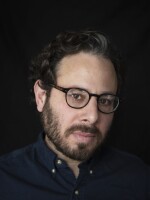For years, Starbucks has described its stores as a "third space" — a quasi-public place, away from home or the office, where anyone is welcome to hang out.
But the rules about that space are murky. They can vary from place to place, and even store to store. The way the rules are enforced isn't always consistent, either, which is how unconscious bias and discrimination can creep in.
Now, the arrests of two black men at a Starbucks store in Philadelphia last week are raising uncomfortable questions for the company and others like it.
The men were arrested after asking to use the store's bathroom while waiting for a friend. A store manager asked them to leave because they hadn't bought anything, and then called the police.
A video that shows the men being led out in handcuffs has been viewed more than 10 million times.
The company's CEO Kevin Johnson has apologized repeatedly for how the incident was handled. "Starbucks was built as a company that creates a warm, welcoming environment for all customers," he said in an interview with ABC's Good Morning America. "That didn't happen in this case."
"It's part of a very, very long story about African-Americans and how we are treated in public spaces and retail establishments," said Sherrilyn Ifill, the president of NAACP's Legal Defense and Educational Fund, in an interview with NPR's Morning Edition.
"I think unfortunately that video, for many of us, was too familiar," Ifill said.
Ifill will help shape the training that tens of thousands of Starbucks employees will receive next month.
"It's like being a black male sometimes I'm being honest, like you're looked upon as being a threat, just by waking up in the morning trying to buy a cup of coffee," said Troy Jackson of Philadelphia.
Jackson stopped to peek in the window of the Starbucks store where the arrests happened.
He says what's captured in that video is not unique.
"It totally shows those microaggressions that occur to all people, but particularly black males, that go unheard, that go unseen," he said.
The arrests did not come as a shock to longtime Starbucks observer Byrant Simon. He visited more than 300 stores across the country when he was writing a book called, Everything But the Coffee: Learning About America From Starbucks.""I would normally sit for a while, sometimes as much as five hours," said Simon, who is white. "I was never challenged about sitting there, about meeting people there, or about using the bathroom."
But Simon says he did see other people confronted about whether they had bought anything. Simon says they fell into two categories: people who appeared to be homeless, and black men.
"Starbucks it offers itself up as a public space, right? Come, stay as long as you want." But that promise of welcoming space brings with a whole series series complicated questions to to sort out, Simon said.
Questions Starbucks is still trying to answer.
Copyright 2021 NPR. To see more, visit https://www.npr.org.




